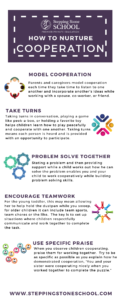How to Help Your Child Learn to Cooperate
I recently came across a cooperative board game in which three or four players work together to complete a task to win the game before they run out of time. Interested, I tried the game out with my own children and here is what I found:
While playing a cooperative game versus a traditional “single winner” game
- There was less arguing and whining between children,
- More laughing and encouragement of one another, and
- A quicker recovery time when the group lost the game.
Working together, cooperating, provides an opportunity to come together for a common goal. Whether playing a game, building a tower, or working to complete a given task, cooperation is a skill necessary for children to learn from a young age.
How to help your child learn to cooperate:
- Model Cooperation. Parents and caregivers model cooperation each time they take time to listen to one another and incorporate another’s ideas while working with a spouse, co-worker, or friend.
- Take Turns. Taking turns in conversation, playing a game like peek-a-boo, or holding a favorite toy helps children learn how to play peacefully and cooperate with one another. Taking turns means each person is heard and is provided with an opportunity to participate.
- Take time to problem solve together. Stating a problem and then providing support while a child works out how he can solve the problem enables you and your child to work cooperatively while building problem-solving skills.
- Encourage teamwork. For the young toddler, this may mean allowing her to help hold the dustpan while you sweep, for older children it can include team sports, team chores or the like. The key is to set up situations where children respectfully communicate and work together to complete the task.
- Use specific praise. When you observe children cooperating, praise them for working together. Try to be as specific as possible as you explain how he demonstrated cooperation, “You and your sister were cooperating nicely when you worked together to complete the puzzle.”
Cooperation is one of those skills we are always learning. By participating in tasks cooperatively from an early age, children will gain a better understanding of the meaning of the value of cooperation.

Resources:
Brown, K. (2016, Feb. 22). “5 Tips for Teaching Cooperation.” Retrieved on August 1, 2016 from http://www.kidsintransitiontoschool.org/5-tips-for-teaching-cooperation/
Slover, D. (2011, March 5). “10 Ways to Teach Your Kids Cooperation.” Retrieved on August 1, 2016 from http://www.selfgrowth.com/articles/10-ways-to-teach-your-kids-cooperation
Zero to Three. (2010, Feb. 20).“Tips on Helping Your Child Learn to Cooperate.” Retrieved on August 1, 2016 fromhttp://www.zerotothree.org/child-development/social-emotional-development/tips-on-helping-your-child-cooperate.html